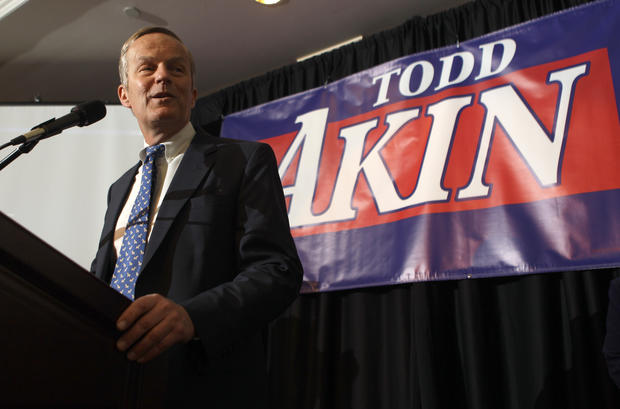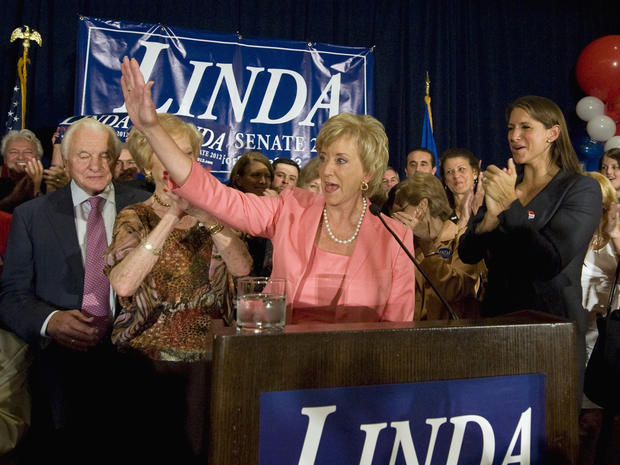Amid surprise shifts, Senate control up for grabs
(CBS News) Ever since the 2010 midterm elections, when Republicans regained control of the House of Representatives and picked up six seats in the Senate, the battle for control of the Senate has promised to be competitive: The two parties are separated by effectively six seats in the chamber, and both sides are pouring millions of dollars into the effort to seize control.
Democrats have a particularly robust roster of candidates to defend this cycle: Of the 33 seats up for grabs in 2012, 23 are held by Democrats. Republicans, meanwhile, need to flip just four seats - three if Mitt Romney wins and his vice president can serve as a tiebreaker - in order to gain the advantage.
Thanks to several unexpected and potentially game-changing developments, however, control of the Senate is still very much in play.
"Until the end of February I gave Republicans a 65-70 percent chance of taking the majority because it was all a numbers game," said Jennifer Duffy, who analyzes Senate and governor races for the The Cook Political Report. Now, Duffy gives the Republicans a 45 percent chance of taking the chamber.
"There's still a path to the majority for Republicans," she said. "But it's a lot harder."
Political game-changers
One of the most-watched races of the cycle is taking place in Massachusetts - where first-time candidate Elizabeth Warren is taking on Republican incumbent Scott Brown, who was elected with Tea Party support following the death of Sen. Ted Kennedy, who held the seat for almost 50 years. Warren, a consumer advocate tapped by President Obama to head up the Consumer Financial Protection Bureau (CFPB), was seen as a promising leader whose voice could easily find a place in the solidly liberal Massachusetts. But Warren consistently struggled to secure a definitive advantage over Brown in the polls, and she faced setbacks over a controversy about whether or not she improperly identified herself as Native American to further her career.
Two new surveys, however, show Warren opening up an apparent lead against the Republican incumbent - suggesting that the significant Democratic investments into her candidacy may finally be paying dividends.
A new poll out Tuesday by the Suffolk University Political Research Center shows Warren leading Brown 48 percent to 44 percent, while a survey released Monday by Western New England University's Polling Institute (WNEU) shows Warren leading by 6 points, at 50 percent to Brown's 44 percent. A previous WNEU poll from June showed Warren with a slimmer 2-point edge over Brown.
"We've seen quite a bit of evidence that the race is inching in her favor," said Matt Canter, communications director for the Democratic Senatorial Campaign Committee (DSCC). If that turns out to be true, Democrats could pick up a Republican seat in Massachusetts - giving the party a much-needed buffer against potential GOP wins.
Democrats have also been optimistic about their chances to hold on to at least one seat that had long been considered among their most vulnerable - thanks to a handful of very controversial remarks by Republican candidate Todd Akin.
Akin, a six-term Missouri congressman, came under fire last month after suggesting in a local interview that women are unlikely to become pregnant in cases of "legitimate rape." The outcry against Akin's comments were unanimous, and Republicans both disavowed his candidacy and called for him to drop out of the contest. Akin, however, has repeatedly refused to do so, acknowledging that he "may not be the favorite candidate of some people within the Republican establishment" but pledging to stay in the race through the November election regardless.
"In some ways Missouri was looking like the easiest win for Republicans," said Duffy, who pointed out that Akin - considered the weakest of the three major Republican primary contenders - was beating Democratic incumbent Claire McCaskill prior to "rape" comments. If he does indeed stay in the race, he'll get virtually no money from the party, and McCaskill will go "unanswered" in her attacks against Akin, according to Duffy.
"What a disaster for Republicans," said Larry Sabato, director of the University of Virginia's Center for Politics. "If Akin stays in they've probably thrown away a sure thing."
Brian Walsh, of the National Republican Senatorial Committee (NRSC), acknowledged that situation in Missouri has "added a complication to our efforts," but he argued that "there's certainly a path there even without that state."
Citing Maine as a seat he believes Republicans could hold on to even in light of longtime Senator Olympia Snowe's retirement, Walsh argued " we've seen other states come onto the landscape" that can make up for a potential loss in Missouri.
"I think Republicans are cautiously optimistic there is very much a path there -- in fact there are multiple paths -- but no one has ever thought that winning back the Senate will be easy," he said.
Sabato had a less optimistic view for Republicans.
"Between Olympia Snowe and Todd Akin - that's the Senate," Sabato said.
Candidates and campaigns matter
As the election grows closer and presidential candidates exert the full influence of their campaign efforts, many Senate races will trend with the national tides: The so-called "coattail" effect will be a defining factor in a number of key Senate races.
"I would say Florida, Ohio, New Mexico and Hawaii, for example, the state is beginning to fall more in line behind the presidential race," said Duffy. But, she says, in states where "neither party is ahead in any meaningful way, there's no wind in either party's back. That's when candidates and campaigns matter."
According to Duffy, Connecticut and Indiana are prime examples of how a candidate's weaknesses can outweigh the state's political tendencies.
"The quality of the candidate in places like Indiana and Connecticut seems to be trumping the state's normal tendencies," she said.
In Connecticut, Democratic Rep. Christopher Murphy is facing a surprising challenge from Linda McMahon, the co-founder of World Wrestling Entertainment Inc., who was trounced by 12 points in her 2010 Senate bid against Richard Blumenthal. McMahon, however, has worked hard to retool her image, according to the Wall Street Journal, and has shown a willingness to tap into her own financial resources in her ongoing electoral endeavors: Per the Associated Press, McMahon spent $50 million of her personal wealth on the 2010 bid, and with her husband earned $24.1 million last year. The apparent result can be seen in the polls: A late August survey from Quinnipiac shows McMahon leading Murphy by .6 percent in a state that is trending reliably Democratic on a national level.
In Indiana, meanwhile, Sabato says conservative Republican nominee Richard Mourdock is suffering from a "backlash" after ousting longtime moderate Senator Dick Lugar in the party's primary.
"Voters regard Mourdock as just being too far to the right," Sabato said.
The NRSC's Walsh brushed off the notion that Mourdock might be in trouble.
"Obviously the Democrats are trying to put Indiana on the map but at the end of the day it's a strong Republican state and we're confident that we're going to hold that seat," he said.
Too soon to say?
Duffy warns that even though the election is less than three months away, in some states, voters have only recently become engaged in the Senate elections. She cites Wisconsin, which held its primary in mid-August, as one example.
"The Republican primary got very little attention and when the race started [GOP candidate Tommy] Thompson had the advantage," she said. "Now that voters have been thoroughly engaged, let's see what happens."
As of August, a poll from CBS News/New York Times/Quinnipiac showed Thompson leading Democratic candidate Tammy Baldwin by 6 percent.
Canter argued that Thompson got a "small unofficial bounce" after the primary, however, and that a "major movement" towards Baldwin is already underway as voters get to know Thompson.
"I think that Republicans have lost their way in so many key states that they thought were in their column that Wisconsin immediately has become a must-win," Canter said. "I don't think they've successfully put that away."


